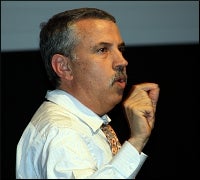 |
Thomas Friedman Source: Melissa C. Beckman |
SILVER SPRING, MD — We need massive change, author Thomas Friedman told the Freedom to Connect conference, calling for a green revolution to solve the nexus of problems that gives his most recent book its title, Flat, Hot, and Crowded.
“It’s not a revolution if nobody gets hurt,” he said. “It’s a party. And that’s what we’ve been having. We’ve been having a green party. It’s a lot of fun and I get invited to all the parties but it’s not a revolution.”
The Energy Technology (ET) revolution will be as disruptive as the IT revolution, he claimed. Friedman said that he covered the IT revolution in his previous book, The World is Flat, and at the time the IT industry had a motto, “adapt or die.” Until companies have to adapt to green principles or die, it’s not a revolution.
It’s necessary because of five world crises: demand for natural resources and energy, petrodictatorships, climate change, energy poverty, and the loss of biodiversity. “We’re going to burn up, choke up, smoke up, and eat up this planet,” he said.
Changes are urgent. Friedman said he told Al Gore to write an editorial apologizing to the world — for underestimating the extent of climate change. While initial predictions said that polar ice would disappear by 2101, the polar oceans may be free of ice for the month of July by 2013.
Friedman said that in too many countries, the price of oil is inversely related to the extent of freedom. He noted the Arab world is not culturally hostile to democracy — the Arab world’s one democracy is Lebanon, a nation with no oil, and its most rapidly liberalizing country is Bahrain, which was the first to discover oil and will be the first to run out of it.
As to biodiversity, which some at the conference suggested was not as important as the other issues, Friedman said that it’s occurring at a rate that’s 1,000 times faster than normal. “If anything else were at 1,000 times the norm, that’s all we’d be talking about.”
All of this is being driven by the rate of growth of the world’s population. We’re adding a billion people every 13 years, Friedman said. If all they required was a single 60 watt light bulb for four hours a day, we would need twenty new 500 megawatt coal burning power plants.
Energy poverty means that many people don’t have even a single light bulb, Friedman said. He showed a photograph of students in Africa doing their homework in an airport parking lot because that was the only location that had light at night.
“People who have no electricity won’t be able to dig a deeper well when the water runs out, power even a small fan when it gets hot, or, most important, get to Google — to the world’s libraries, universities, and books,” he said. “They will fall behind, not at a normal pace, but exponentially.”
Next page: “We’re cooked. Let’s party.”
Page 2 of 2
While some might look at these problems and say, “we’re cooked… let’s party,” Friedman asked that Americans see the list as an opportunity to get back into the business of solving the world’s problems. “We need to make abundant, cheap, clean, renewable, and reliable electrons and molecules,” he said.
Green technology has an advantage over natural resources, Friedman said, because as demand for technology rises, its cost declines. Natural resources, on the other hand, follow the opposite curve: their price rises as demand rises.
The flip side
But green technology also has two great disadvantages. The first is that for every green technology, there is a cheaper and dirtier alternative, and that problem will not be fixed until government sends a clear and consistent price signal.
Friedman said that with gas at $1.50 per gallon, you couldn’t sell a Prius and at $4 per gallon, you couldn’t buy one because they were out of stock. Unless the government imposes the fully burdened cost of oil — the CO2 emissions and the cost of sending troops abroad to protect oil supplies — the dirty technology will win.
The second disadvantage is the name. “Green was named by its opponents,” Friedman said. “It is girly, sissy, unpatriotic and even vaguely European. But I’m telling you that green is the new red, white and blue. It’s capitalistic and nationalistic. It’s about national power, economic power, and global respect.”
The answer starts with government and is delivered by innovation, Friedman said. During a retreat with GE, he said that GE CEO Jeffrey Immelt said that if the president set the price, there would be a period of complaint followed by rapid adaptation. Friedman said he called up Immelt and said, “basically, you’re asking us to be China for a day.”
The government will have to intervene in the market to start the green revolution that Friedman advocates, but the actual technology will be delivered by American scientists. “I believe it has to be the United States of America,” he said, “or our chance of passing on our standard of living to our children is zero.”
In a sense, he said, his message is optimistic. He said that it’s cool that the five greatest problems in the world all have the same solution.
But it has to happen now because there’s no time for later. “Later was a luxury of previous generations,” he said. “You could paint the same landscape or eat the same fruit that you had in your childhood. You could do it later because nature seemed bountiful and all threats to it insignificant. But later will be too late. Whatever you want to save, start saving it now.”


